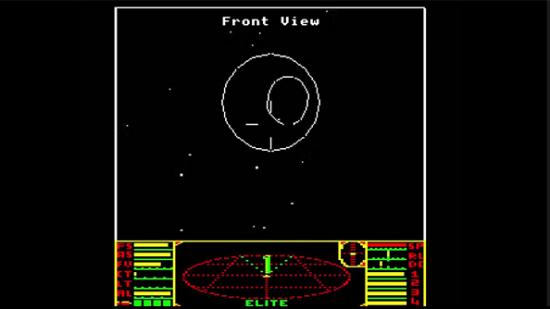Elite was the most ambitious game ever made. And it’s ambition that matters. Thirty years ago, back in 1984, two Cambridge undergraduates realised that the computers of the day: the Acorn Electron and the BBC Model B could be pushed further and better than had ever been attempted. They could host more than just platform and adventure games. They could host a planet. Maybe a solar system. No, more, a galaxy. Oh wait. Just for kicks, eight galaxies.
Their game was to redefine what was possible. Their game was Elite. It birthed an entire genre. And soon, the next version of Elite, Elite: Dangerous will try it all over again.
Elite was an open galaxy space game created before such a thing was meant to exist. Players started the game with a ship, a mere 100 credits to their name, and were given the freedom to explore a vast solar system, trade in legal and illegal goods, upgrade their ship, battles pirates, aliens and everything in between. I was immediately hooked.
Elite was a technical masterpiece. The two developers, David Braben and Ian Bell, used the mere 256Kb of RAM on the BBC Model B to host an algorithmically generated galaxy. Each star system was host to a space-station and a planet, maybe some asteroids. Distances between worlds required a hyperspace jump to traverse. It was brutal: death was swift, and unexpected. It came, not with a learning curve, but a learning cliff. New players had to learn how to dock their ship manually – rotating their ship to perfectly match the letterbox holes on the sides of spacestations as they slowly span in space. Most discovered that it was all too easy to leave a crater on the docking bay wall.
It was also funny, richly detailed beyond what you’d expect. The game starts you off with a Cobra Mk III. You will also see Cobra Mk I ships flying around. Thirty years later I still remember wondering, as a child, why there was no Cobra Mk II – only to then read the manual and discover that it never made it to production because there was a design fault in the hull. Such a silly, tiny detail, but it made all the difference in the world to me. It showed that this was a universe where mistakes happened, and that made it feel a thousand times more real and compelling.
The manual. Depending on your age, you may or may not remember a time when game manuals were a thing. I took the Elite manual to school every day for weeks, until the cover fell apart. Not just because I was a fan of the game, but because the manual itself illustrated the rich Elite universe. It had gorgeous hand drawn illustrations of your ship’s cockpit, for example, never seen in-game. Detailed descriptions of other ships, their manufacturers, loadout, purpose, and reputation.
I remember discovering a Python (all of Elite’s ships were named after species of snake), a huge, sleek trading vessel – lumbering through space, ignoring me. I flew as close as I dared, matched speed, and just… watched it fly. Why was I so fascinated? Because it didn’t care about me. Every other game I played had a world created specifically for me. Everything in it wanted to kill me, sell things to me, or be rescued by me. I was used to being the absolute centre of these fictional worlds – but not here.
I wasn’t the only one. Garry Penn was the creative director at DMA Design, the company behind the original Grand Theft Auto. To him, “the single most amazing thing about Elite was the quality of its illusion, particularly given its constraints. It suggested so much more than was actually there, which is a rare and beautiful thing.”
Elite’s legend persists. Two sequels followed: Frontier: Elite II in 1993 was the first game to attempt procedurally generated star-systems, and accurately mapped the known Milky Way. Frontier: First Encounters let players fly from orbit to land on planets. And then nothing.
Until 2012. Frustrated by the game’s industry’s conservative publishers, David Braben, took the concept of a sequel to Kickstarter. The game successfully raised over a million dollars, easily funding development. It’s been playable, in alpha and beta versions for months, and it’s spectacularly good. Polished, expansive, and riveting, it absolutely recaptures the magic of the original games, in glorious detail. Fizzing through an asteroid belt, skimming the surface of a planet’s rings, skimming the edges of a space-station… it is the space-simulator of your dreams, and probably the most exciting PC game of 2014.
Elite matters, not just because it’s a dusty relic of what the games industry was. It’s because it’s a brilliant, modern, extremely fun game for today. And you can play right now for free.
